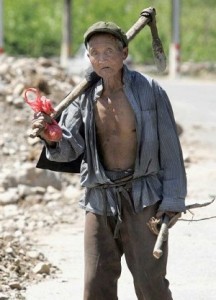The Story of an Average Chinese Farmer
Ever since Deng Xiaoping reformed China’s economy in 1978, the Communist country has been enjoying rapid economic growth. An industrial powerhouse, China has quickly established itself as a global player in international politics. But behind this veiled economic growth lie vast income inequalities that span across the majority of the region. Unfortunately, while China is moving forward, it is leaving the very people the Communist Party of China fought for in the first place- the farmers.
established itself as a global player in international politics. But behind this veiled economic growth lie vast income inequalities that span across the majority of the region. Unfortunately, while China is moving forward, it is leaving the very people the Communist Party of China fought for in the first place- the farmers.
The Chinese mainland has approximately 700 million rural people, an incredible amount of people not benefiting from the leaps China is making in the world. To single out one specific problem is nearly impossible. But the most basic of these problems begins with the government’s taxation policy. Taxes and fees are not supposed to exceed more than 5 % of a farmer’s income, but the actual amount is a lot larger. Ministry of Agriculture surveys have reported that the peasant tax burden rises as high as 15%, three times that of the official national limit.
Why does this occur? Why is it that the farmers are paying such a high tax and no one is doing anything about it? Corruption. Corruption is widely prevalent in all levels of government all the way from the local rural government to the top state officials. But even the corruption and taxation would have been bearable had the farmers experienced returns such as improved public health and education and more agricultural infrastructure.
It doesn’t end there. Aside from the fact that these poor farmers are subject to higher input prices, lower prices for their goods and intensive taxation, they have also borne the brunt of an urban-industrial focus of economic strategy. Approximately 40 million peasants have been forced off their land to make way for roads, factories and other public and private investments, with two million more being displaced each year.
But here is the question that is on everyone’s minds. What is the next step that China should take that will rectify this problem? Yes, taxes have been lowered and quality of life has improved for these farmers, but they are still far from well off. Many people think that what would automatically lift these farmers out of poverty would be to hand over the state-owned ownership of land to these farmers. Giving peasants marketable ownership rights and developing a legal system to protect them, would bring huge economic benefits. And if peasants could sell their land, they would earn enough money to start life afresh in urban areas.
China also needs to improve its rural financial system. The communist nation needs to repeal the laws that prevent the establishment of private banks in the countryside. The extremely successful concept of microfinance could also be implemented. Microfinance is defined as the provision of financial services to low-income clients. Through microlending institutions, farmers would be able to borrow small sums of money to improve their financial situation and step by step, alleviate themselves from poverty while at the same time contributing to the economy of the country.
While the Chinese government has limited options, it needs to understand that it must act fast in order to prevent a similar revolution that took place over 50 years ago. They must remember that it was the workers and farmers that formed the core of this revolution, and if China continues on this path, there will no doubt be another civil war.
Udit Hinduja is a Program and Research Intern with the SISGI Group’s Research Division. To learn more about the SISGI Group visit www.sisgigroup.org

